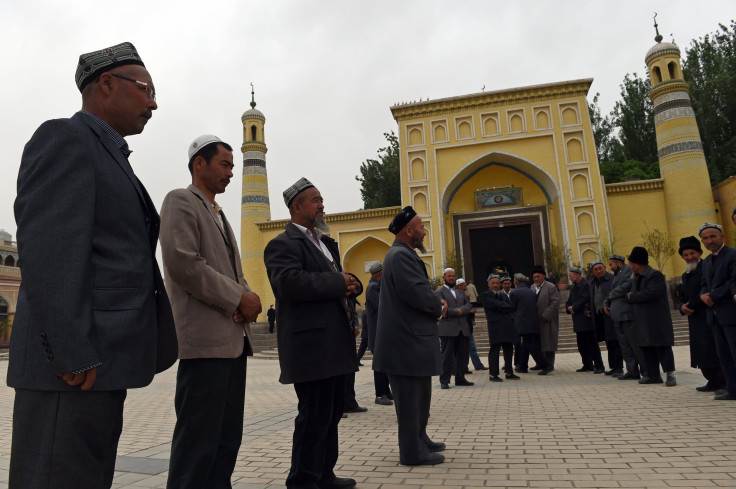At Least 18 Killed In Attack In Northwest China’s Xinjiang Region, Amid Government Crackdown On Islamic Extremists: Reports

SHANGHAI -- At least 18 people have been killed during an attack at a police checkpoint in China’s troubled northwestern region of Xinjiang, accorded to U.S.-based Radio Free Asia (RFA). Chinese media have not yet reported the incident, but if confirmed it would be the latest in a series of attacks in the region, where China is engaged in a bitter conflict with some members of the Muslim Uighur minority, who are seeking independence.
RFA said that the attack took place on Monday in Kashgar, China's westernmost city, close to its border with Central Asia. RFA quoted a local police officer as saying that attackers drove into a police checkpoint at high speed, and killed several police officers using “knives and bombs,” Reuters reported. The officer said police fought back, killing 15 suspected terrorists.
The attack took place at the start of the festival of Ramadan, the Muslim holy month, considered a sensitive time in the region.
Xinjiang, a massive mainly desert region, has been hit by a series of attacks in recent years, amid rising tension between its indigenous population, made up of some 12 million Muslims from a number of ethnic groups, dominated by the Uighurs, and more than 8 million settlers from eastern China.
The Chinese authorities say Islamic groups based across the border in Central Asia have been promoting religious extremism in Xinjiang. Last year the Chinese government launched a crackdown on terrorist groups, following an attack in a crowded street market in the region’s capital, Urumqi, in which 39 people were killed, and another at a railway station in the southwestern Chinese city of Kunming, in which 31 people were stabbed to death by people the police said were separatists from Xinjiang.
Last month police announced that they had broken up 181 violent terrorist groups in the past year, after targeting gangs, organizers and supporters. However, attacks have continued -- including one close to Kashgar last July, in which police said they shot dead 59 attackers, and 37 civilians were killed, and a series of bomb attacks in a small town last September, in which six civilians were reported killed, along with 40 attackers. Just last week Radio Free Asia reported that police had shot dead at least eight people following a shootout with a suspicious group camping in a river valley in Hotan, about 300 miles southeast of Kashgar.
The number of attackers involved in many of these incidents, including the most recent one, is a reminder of the challenge the authorities face in Xinjiang, where party boss Zhang Chunxian last week told local religious leaders that the region was facing an escalation of "infiltration and sabotage activities in the name of religion." State media recently published a report about a talented young Uighur student who was persuaded to go for training with extremist groups outside China. The report also said that more than 1,200 people had been arrested for illegally crossing the region's borders in the eight months to January, while 300 Chinese nationals were reported to be fighting with the Islamic State group in Iraq and Syria.
The authorities last year pledged to combine an “iron fist” against terrorism with an education campaign aimed at winning hearts and minds, and rooting out “violent terrorist thought at its source.”
State media say the authorities have sought to encourage assimilation of Uighurs, and have “vigorously promoted modern living in the region,” encouraging "modern-style weddings and funerals," in response to what they called “the shadow of the past where religious extremism meant weddings without singing or dancing, where people couldn’t cry at funerals.” They have also launched campaigns against male students growing beards, banned the burqa in some areas, and encouraged women to “wear their colorful traditional dress… and reveal their pretty faces," while rural young people are reported to have been offered professional training and help with starting businesses.
And according to the official Xinhua news agency, the authorities have said they will “offer more than 300 million yuan (about $48 million dollars) in cash rewards to those who helped hunt suspected terrorists.”
However some of the government’s efforts have provoked dissatisfaction among some Muslims. China recently announced that, for the second year, it was banning Muslim government officials, civil servants and students from observing the Ramadan fast. Authorities have also called on residents in some areas to hand in their passports, and in one village, insisted that shops sell alcohol despite protests from some Muslim residents.
Last week overseas Uighur groups also criticized the organizing of beer-drinking contests with cash rewards, which local media said were designed to "use modern culture to brighten up... cultural life, squeeze the space for illegal religious promotion, and guarantee... harmony and stability."
However the head of the government-backed Xinjiang Islamic Institute in Urumqi said earlier this year that there was a need to train more “authoritative religious leaders” to prevent people being won over by what he said were extremists distorting the Quran to “incite Muslims to into terror attacks.” Abudulrekep Tumniaz told China.org that there was still a "shortage of such high-level and respected religious leaders."
© Copyright IBTimes 2024. All rights reserved.






















